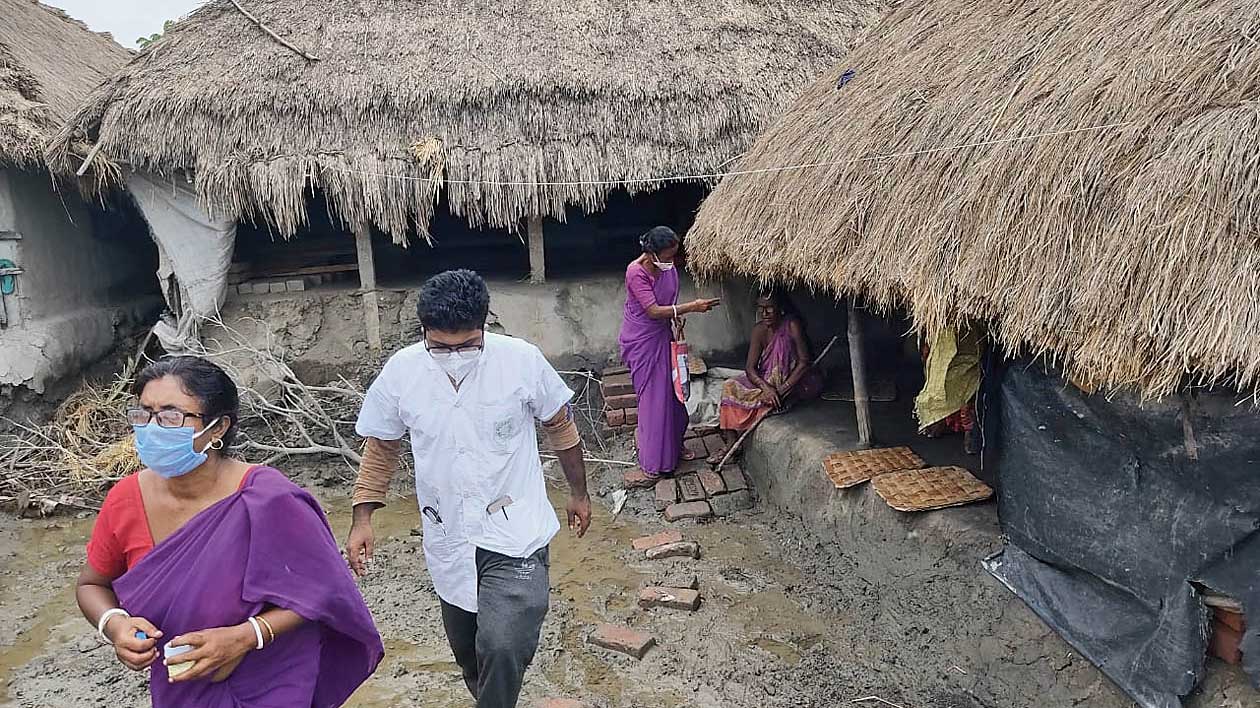Floodwater accumulated in the aftermath of Cyclone Yaas at several villages in coastal districts of North 24-Parganas and South 24-Parganas, including those located in and around Gosaba and Sagar Island, has led to disruption of grassroots health services.
Sources said over a few hundred ground-level health workers were unable to provide their services as their homes had either been damaged in the cyclone or remain inundated in the floodwater.
On the other hand, nearly 100 health centres in rural areas of the two cyclone-hit districts remained submerged in saline floodwater for almost a week.
Gita Samanta, 45, an accredited social health activist (ASHA), from Sagar’s Ghoramara island was left homeless when Cyclone Yaas blew away her home’s tin roof and caused irreparable cracks in the wall leading to its collapse.
“Throughout the Covid-19 pandemic, I was the one extending whatever little help I could to infected people. Now I am in the biggest need of help,” Gita said on Tuesday, standing under a tarpaulin she erected a few metres from the ruins of her former home.
Both the districts have seen a steady rise in Covid cases in tandem with the second wave last month. On Wednesday, North 24-Parganas and South 24-Parganas logged 1,860 and 606 new cases, respectively.
Alluding to the severity of the situation, Gita asked: “How can I do anything now? What if someone needs my help.”
Gita is one of a handful of accredited rural health workers in the Sagar area, all of whom are reportedly now either battling Covid-19 or the cyclone’s aftermath.
“It is really a difficult situation,” said auxiliary nurse Rituparna Ghati.
Sudha Maity, another Asha worker from Kuemari in South 24-Parganas, said she had to take shelter in the house of a neighbour as her home had gone underwater.
“Everything in my house was washed away by saline flood water. Now I am struggling for my livelihood. If the government stands by us, we will be able to provide better services. Even in such adverse conditions, I am trying to provide whatever service is possible,” said Maity.
The only glimmer of hope has come in the form of block medical officer Indranil Bargi who visited the homes of health workers on a boat and delivered medicines. “If I don’t take care of them now, then who will help us later when we will need it,” he said.
Sources said diarrhoea had become an increasing problem in the area following Cyclone Yaas.
“We need to appreciate all volunteers and villagers who have come forward to help us notwithstanding their own troubles,” Bargi said.
“A lot of people have been affected in South 24-Parganas but accumulation of water for almost a week is making it difficult to deliver health services. Our workers are working hard even though they are in a very critical situation,” said Somnath Mukhopadhyay, the South 24-Parganas chief medical officer of health.
Sources in the South 24-Parganas district administration claimed at least 50 health sub-centres remained underwater even on Tuesday. The number of health centres that remain underwater in North 24 Parganas is almost 20.
The disruption caused by non-functioning health centres has become a matter of concern for the state health directorate.
A senior health official in South 24-Parganas said: “Water entered health sub-centres because of high tides. Huge stocks of medicines kept at the centres were damaged.”
“We are still not in a position to access those centres to provide service to the people who are themselves inundated and are suffering from water-borne diseases.”











